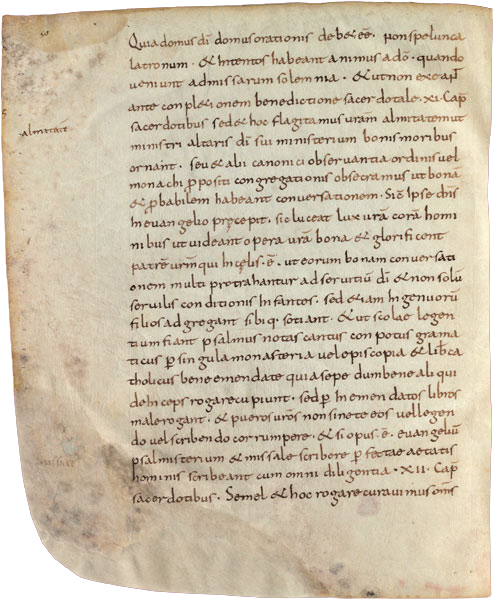789 Deaths on:
[Wikipedia]
[Google]
[Amazon]
 __NOTOC__
Year 789 ( DCCLXXXIX) was a
__NOTOC__
Year 789 ( DCCLXXXIX) was a
 __NOTOC__
Year 789 ( DCCLXXXIX) was a
__NOTOC__
Year 789 ( DCCLXXXIX) was a common year starting on Thursday
A common year starting on Thursday is any non-leap year (i.e. a year with 365 days) that begins on Thursday, 1 January, and ends on Thursday, 31 December. Its dominical letter hence is D. The most recent year of such kind was 2015 and the next one ...
(link will display the full calendar) of the Julian calendar
The Julian calendar, proposed by Roman consul Julius Caesar in 46 BC, was a reform of the Roman calendar. It took effect on , by edict. It was designed with the aid of Greek mathematicians and astronomers such as Sosigenes of Alexandr ...
. The denomination 789 for this year has been used since the early medieval period, when the Anno Domini
The terms (AD) and before Christ (BC) are used to label or number years in the Julian and Gregorian calendars. The term is Medieval Latin and means 'in the year of the Lord', but is often presented using "our Lord" instead of "the Lord", ...
calendar era
A calendar era is the period of time elapsed since one ''epoch'' of a calendar and, if it exists, before the next one. For example, it is the year as per the Gregorian calendar, which numbers its years in the Western Christian era (the Coptic ...
became the prevalent method in Europe for naming years.
Events
By place
Europe
* KingCharlemagne
Charlemagne ( , ) or Charles the Great ( la, Carolus Magnus; german: Karl der Große; 2 April 747 – 28 January 814), a member of the Carolingian dynasty, was King of the Franks from 768, King of the Lombards from 774, and the first Holy ...
crosses the Elbe River
The Elbe (; cs, Labe ; nds, Ilv or ''Elv''; Upper and dsb, Łobjo) is one of the major rivers of Central Europe. It rises in the Giant Mountains of the northern Czech Republic before traversing much of Bohemia (western half of the Czech Repu ...
with a Frankish
Frankish may refer to:
* Franks, a Germanic tribe and their culture
** Frankish language or its modern descendants, Franconian languages
* Francia, a post-Roman state in France and Germany
* East Francia, the successor state to Francia in Germany ...
-Saxon
The Saxons ( la, Saxones, german: Sachsen, ang, Seaxan, osx, Sahson, nds, Sassen, nl, Saksen) were a group of Germanic
*
*
*
*
peoples whose name was given in the early Middle Ages to a large country (Old Saxony, la, Saxonia) near the Nor ...
army into Obotrite
The Obotrites ( la, Obotriti, Abodritorum, Abodritos…) or Obodrites, also spelled Abodrites (german: Abodriten), were a confederation of medieval West Slavic tribes within the territory of modern Mecklenburg and Holstein in northern Germany ( ...
territory. He subdues the Wiltzes
The Veleti, also known as Wilzi, Wielzians, and Wiltzes, were a group of medieval Lechitic tribes within the territory of Hither Pomerania, related to Polabian Slavs. They had formed together the Confederation of the Veleti, a loose monarchic c ...
, and reaches the Baltic
Baltic may refer to:
Peoples and languages
* Baltic languages, a subfamily of Indo-European languages, including Lithuanian, Latvian and extinct Old Prussian
*Balts (or Baltic peoples), ethnic groups speaking the Baltic languages and/or originati ...
.
* King Pepin of Italy
Pepin or Pippin (or ''Pepin Carloman'', ''Pepinno'', April 777 – 8 July 810), born Carloman, was the son of Charlemagne and King of the Lombards (781–810) under the authority of his father.
Pepin was the second son of Charlemagne by his th ...
conquers Istria
Istria ( ; Croatian language, Croatian and Slovene language, Slovene: ; ist, Eîstria; Istro-Romanian language, Istro-Romanian, Italian language, Italian and Venetian language, Venetian: ; formerly in Latin and in Ancient Greek) is the larges ...
on the Adriatic
The Adriatic Sea () is a body of water separating the Italian Peninsula from the Balkans, Balkan Peninsula. The Adriatic is the northernmost arm of the Mediterranean Sea, extending from the Strait of Otranto (where it connects to the Ionian Sea) ...
, ignoring Byzantine
The Byzantine Empire, also referred to as the Eastern Roman Empire or Byzantium, was the continuation of the Roman Empire primarily in its eastern provinces during Late Antiquity and the Middle Ages, when its capital city was Constantinopl ...
protests. He establishes a tributary march
March is the third month of the year in both the Julian and Gregorian calendars. It is the second of seven months to have a length of 31 days. In the Northern Hemisphere, the meteorological beginning of spring occurs on the first day of Marc ...
, and sends missionaries
A missionary is a member of a religious group which is sent into an area in order to promote its faith or provide services to people, such as education, literacy, social justice, health care, and economic development.Thomas Hale 'On Being a Mi ...
.
* Charlemagne issues the ''Admonitio generalis
The ' is a collection of legislation known as a capitulary issued by Charlemagne in 789, which covers educational and ecclesiastical reform within the Frankish kingdom. Capitularies were used in the Frankish kingdom during the Carolingian dynasty b ...
'', which covers educational
Education is a purposeful activity directed at achieving certain aims, such as transmitting knowledge or fostering skills and character traits. These aims may include the development of understanding, rationality, kindness, and honesty. Vari ...
and ecclesiastical
{{Short pages monitor